OP Sequence
 |
 |
 |
 |
 |
 |
OP: 「Datenshi 」 (Fallen Angel) by (Creepy Nuts)
 |
 |
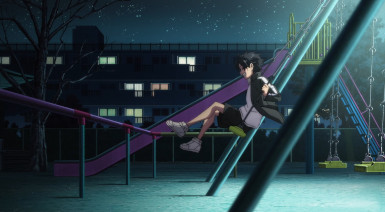 |
 |
 |
 |
 |
 |
 |
 |
 |
 |
 |
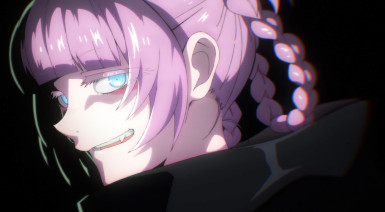 |
 |
 |
 |
 |
 |
 |
 |
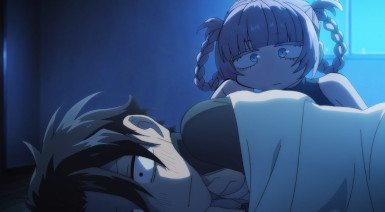 |
 |
 |
 |
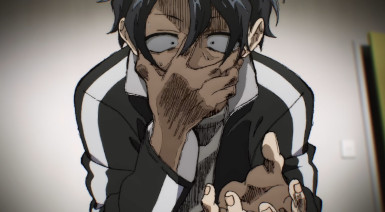 |
 |
 |
 |
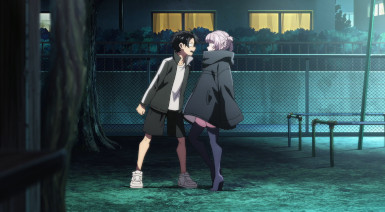 |
 |
 |
 |
 |
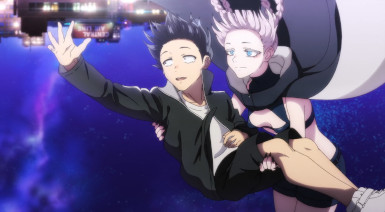 |
 |
「ナイトフライト」 (Naito fraito)
“Night Fright”
Another of summer’s big dogs dives into the pool, as Kotoyama’s Yofukashi no Uta becomes his second adaptation. Dagashi Kashi aired for two seasons, with different directors and different studios. I preferred the first, directed by Takayanagi Shigehito at feel. – which puts me solidly in the minority. This time around the director is Itamura Tomoyuki, which was actually my chief reservation about this show. He did a decent enough job with Vanitas no Carte at Bones, but his Shaft DNA was still unmissable. At that level it wasn’t a deal-breaker, but much more and it would have been a real problem.
I find that most of the time when directors escape Shaft (Oonuma Shin most famously) they tend to tone it down a fair bit. You would never have mistaken Itamura’s upbringing for any other studio when watching Vanitas, but it was a seasoning rather than the main dish. That’s the case with Call of the Night so far, and as long as it stays at that level I can live with it. Itamura does have some panache above and beyond the Shaft-isms, and in fact this premiere was quite high-level in terms of production values by Lidenfilms standards. The backgrounds were lovely and the animation was quite fluid for the most part.
If someone were to ask me what my overall impression of Yofukashi no Uta was based on the first episode, I’d have an unusually easy time answering. For me, this was as if Dagashi Kashi and Nazo no Kanojo X had a love child. There’s a broadly similar premise here to Dagashi – innocent teen boy has his life changed by the appearance of a weird girl. But the vibe is very much MGX (which is praise from me, as I love that series). And in point of fact, Dagashi Kashi is very much in the MGX vein – a “giant robot series with a girl as the giant robot” as MGX mangaka Ueshiba Riichi called it.
The innocent boy in this case is Yamori Kou (Sato Gen), a 14-year old who sneaks out of the house after his parents are asleep for the first time (always a thrilling watershed in any teen’s life). Kou was living a normal school life until he was confessed to, and was ostricized by the friends of the girl whose confession he rejected. This disruption of his existential norms sets Kou off on a dark path, and he winds up an insomniac. Eventually he stops going to school altogether and stops sleeping at night in favor of his rambles – though his parents seem to be unaware of any of this so far.
This has the potential to go some interesting places, as Kou finds himself unattracted to either girls or boys and until the incident with the confession, never thought of himself as “broken”. Fiction – much less anime or manga – rarely champions the cause of those perfectly happy on their own, who don’t require romantic attachments or sex to feel fulfilled. But there are people like that, and there’s absolutely nothing wrong with it. Whether Kou turns out to be one remains to be seen – there are easier courses for the story to take him – but that angle has a lot of possibilities if Kotoyama decides to take the road less travelled.
Enter Nanakusa Nazuna (Amamiya Sora), whose path crosses with Kou’s just as he’d about to undergo another rite of passage and drink his first beer (from a vending machine in the park). Nazuna is your classic giant robot – pretty and sexy in an unconventional way, weird, full of strange pearls of wisdom about sleeping and the night. Her POV is that those who can’t sleep are those who aren’t fulfilled by how they spent their day – and for examples she uses the three drunk salarymen sleeping it off at the bus stop. All this has a quite relatable appeal to Kou – he’s experiencing the world of the night for the first time, free from the gaze of his parents, and for all he knows people like Nazuka are perfectly normal on the streets at this time (they’re not).
It’s no great spoiler that Nazuna is a vampire – it’s all over the promotional material for the series – but the mirror in the elevator eliminates any doubt. But Kou’s main concern when she invites him up to her place for sleep therapy is that she’s going to ravish him. She does, but not in the way he expects. His blasé response to the truth is amusing – in point of fact, he’s quite disappointed that her snacking on his blood hasn’t turned him into her offspring. As Nazuna tells it, humans only become offspring if they’re in love with the vampire that feeds on them. Kou wants to be one, but considers himself incapable of romantic love. Cue the music, and let the story begin.
Based on Dagashi Kashi and on the strong Nazo no Kanojo X vibe, I’m expecting a lot of symbolism as the story explores the nature of relationships through this surreal scenario. I liked both Kou and Nazuna, I liked the mood and tone and look, and I generally found Yofukashi no Uta’s first episode to be both entertaining and interesting. Like MGX is has the feel of an anime from the 90’s or so, when this sort of adolescent psychological exploration through surrealism was a common theme in anime. We don’t have the great Watanabe Ayumu directing this time of course, and I don’t think Kotoyama is on the level of Ueshiba Riichi as a writer. But there’s something genuinely compelling here, and I suspect Samu’s prediction about Yofukashi’s compatibility with me may turn out to be on-point.

This is indeed my most anticipated anime of the season. As an avid reader of the manga, it’s been an agonizing wait for this adaptation since its announcement back in November 2021. Upon hearing this was being handled by the same director behind “The Case Study of Vanitas/Vanitas no Carte”, I just couldn’t help but laugh because it was a pleasant surprise.
A little side note, you misspelled the female vampire’s name. It’s “Nazuna”, not Nazuka.
I’ll have to disagree with your assessment of Ko. As a manga reader, I’ll try to explain myself with as much restraint as possible. Ko’s insomnia is brought on by dissatisfaction caused from losing all interest in the parameters of his life imposed on him by society’s norms as well as having no sense self-fulfillment or ambitions. In a nutshell, he did things merely for the sake of it while keeping up appearances. He has an introverted personality and is a loner. Thus, Ko does not have the same viewpoints and values as the general population that is the polar opposite of him. The girl who confessed to him was doomed to bad luck because the concept of liking someone, let alone love is foreign to him. A quote from his thoughts in the manga’s first chapter: “Love, romance, who likes or dislikes who… It’s never made any sense to me”.
Through Nazuna, the night world became exciting, liberating and intoxicating. Ko’s ambition of becoming a vampire is both a means of permanently retaining that sense of exciting intoxication and severing ties with everything he deems a nuisance in his normal life. To his eyes, vampirism is the ultimate escape and he wants to achieve it before any second thoughts sink in. Only that falling in love to become one is an obstacle. But because the end goal is so desirable, he’s resolved to do whatever it takes to reach it.
Nazuna is the lovable oddball I believe most would love to keep company with. Upon learning about the adaptation, I automatically figured Nazuna would be voiced by Aoi Yuuki, given her reputation with voicing vampire roles such as Dance in the Vampire Bund’s Mina Tepes, Seraph of the End (Owari no Seraph)’s Krul Tepes and Shiki’s Sunako Kirishiki. However, Sora Amamiya makes for a surprisingly good fit. Actually having a voice, Nazuna sounds quite seductive when she isn’t gorging down booze and making jokes of a sexual nature.
With the anime declared with a 13 episode run, I’m curious to see how much material will be condensed and/or skipped, given that the other characters in the opening won’t be introduced until much later in the story. Perhaps this is a yet to be official split cour series.
” Nazuna is your classic giant robot – pretty and sexy in an unconventional way, weird, full of strange pearls of wisdom about sleeping and the night.”
Well, that’s either a great Freudian slip or a very advanced metaphor. ^^
Not sure what you mean – the giant robot thing? If so it’s kind of explained in the post.
Get in the robot, Kou.
From a few seconds in, it’s pretty obvious this show is an offspring of Shaft. OK, so it’s only the director and the colorist, but their stamp is all over it. Fortunately, that’s a plus for me, so this goes to the top of my list for this season. Apart from Made in Abyss, which as one of the reviewers said, is in a class of its own.
Yeah, I was that one, ROFL.